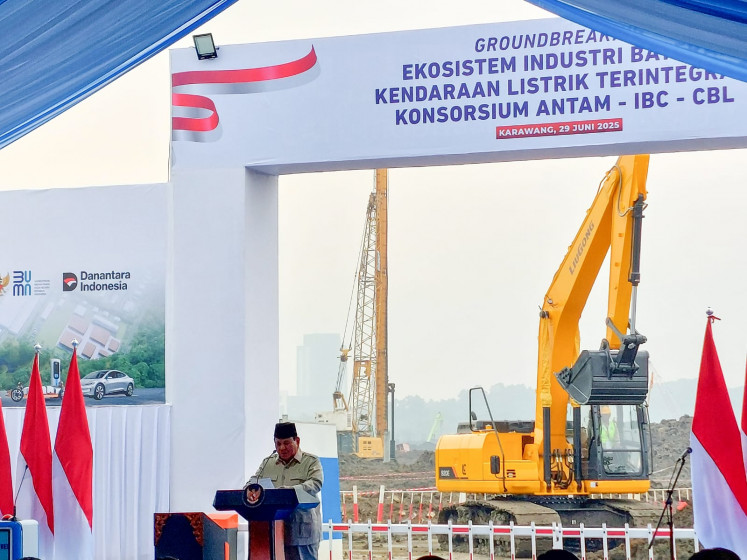Popular Reads
Top Results
Can't find what you're looking for?
View all search resultsPopular Reads
Top Results
Can't find what you're looking for?
View all search resultsPositive parenting to prevent violence against children
Indonesia is in an emergency situation with regard to violence against children
Change text size
Gift Premium Articles
to Anyone

I
ndonesia is in an emergency situation with regard to violence against children. Various cases provide evidence of this. For example, a recent case occurred in Palembang, in which a mother accidentally killed her 4-year-old son, Aditya, using a form of discipline (Nov. 22).
The mother’s emotions often exploded due to family conflict related to the child. Aditya’s mother physically assaulted the child, kicking, biting and hitting him, before she finally killed him with a fatal kick.
Aditya was not alone; aged just 13 months, Alif, in Gowa, South Sulawesi, was also experiencing the same things or even worse. Alif was not only experiencing violence from his mother but also his father, who did not hesitate to kick and hit him for whining.
Alif experienced violence from his parents almost every day until finally he died when he was strangled and kicked by his parents (March 21). Alif’s parents could not cope with the stress of parenting, ending up parenting their toddler through violence.
Yoel, 3, also had the same experiences as Aditya and Alif. He was a victim of his parents’ physical abuse resulting from their financial difficulties until he died at his father’s hands in Bogor (Nov. 26).
As a low- and middle-income country (LMIC), Indonesia faces enormous challenges stemming from poverty, exposure to violence and numerous social pressures.
The social pressures associated with living in a country with limited resources often lead parents to be coercive in their daily parenting and even leads to fatalities caused by family stress.
Violent parenting of children, including coercive parenting using physical punishment, is child abuse. There are at least four categories of child abuse: physical abuse, emotional abuse and neglect, sexual violence and child labor.
Research showed that at least 80-98 percent of children worldwide experience physical violence from their families (United Nations, 2006). There are annually at least 57,000 children under the age of 15 worldwide who die as a result of physical violence (United Nations, 2006).
Physical abuse is defined as everything associated with the use of physical discipline used in parenting, including beating, kicking, biting and everything that can cause death.
In addition to physical abuse, emotional abuse and neglect occur more often in family life. Emotional abuse and neglect are associated with parental behaviors such as threats, ridicule, criticism and ignoring a child’s physical and emotional needs.
Child abandonment often occurs, often combined with physical and even sexual violence.
Indonesia has shown great efforts to protect its children from violence by implementing the new Child Protection Law, Law No. 35/2014, which is a revision of law No. 23/2002.
The government has imposed additional penalties for perpetrators of violence against children, stipulating up to 15 years’ imprisonment. The effort to impose severe penalties on those committing violence is considered a powerful strategy to reduce the amount of violence against children.
However, cases of child abuse in the family environment are very difficult to identify since family privacy is often considered. Child abuse commonly cannot be identified until the worst case has occurred, such as death.
In addition, a cultural understanding that assumes physical violence is an effective parenting strategy still exists in Indonesian society and increases the number of child abuse cases in the country.
This is like the iceberg phenomenon, in which child abuse cases that remain unexposed are much greater than those that have been disclosed in public.
To date, many countries have concerns about child protection (i.e. the United Kingdom, the United States, Australia, Sweden, Belgium, Canada, Germany, Switzerland, China and Japan). These countries have not only implemented child protection laws to protect their children from violence within the family environment, they also focus on preventive strategies by providing positive parenting education to their societies.
As an example, the British government has implemented severe penalties for parents who neglect their children, with sentences of up to 10 years’ imprisonment.
Similar to the British government, the Australian government has child protection laws that impose severe penalties on parents who are violent toward their children.
Parents who neglect or are physically violent to their children can be prosecuted under general criminal law or under child protection laws, with sentences of 10-12 years’ imprisonment.
Indeed, the Australian government has banned physical punishment as a disciplinary strategy.
China, which is known for its authoritarian parenting, has also started to finalize a draft national regulation for child protection to protect children from violence within the family environment.
Similar to the British government, the Chinese government has started to break the assumption that domestic violence is a private matter.
Chinese society has begun to implement positive parenting methods, without the use of physical violence, in an effort to reduce cases of violence against children.
Positive parenting is an approach that aims to support child development and manage behavior using positive strategies and without hurting the child.
This approach is based on positive relationships, good, loving communication and positive attention to child development without using physical punishments.
The implementation of a positive parenting approach in the community is considered a complementary strategy to implementing child protection laws.
The idea is that educating society about positive parenting is a strategy to promote positive parenting without hurting children at home.
Parents are expected to be able to cope with daily family stress when they understand what positive parenting is and how it works.
It is also expected that when parents in Indonesia have knowledge of positive parenting, Indonesian society will understand that physical discipline in parenting is child abuse and against the law.
Therefore, with great efforts from the government to strengthen the implementation of child protection laws, as well as providing positive parenting support for society as a preventive strategy to stop parents being violent, child abuse through parenting in a family environment is expected to reduce to the minimum level.
_________________________
The writer is a research fellow at the Parenting and Family Support Centre, School of Psychology, The University of Queensland, Australia.









